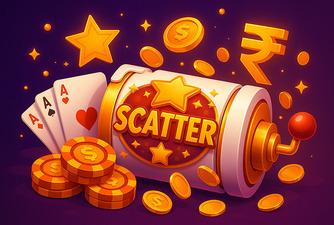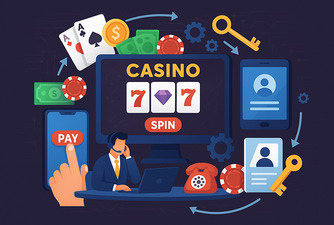Online Casino Licensing: an Economic Driver in New Zealand
The country is preparing for an important reform that will completely transform the local gambling market and position the jurisdiction as a leader in the Asia-Pacific region.
An online casino licensing system will be launched as early as next year. Authorities plan to attract international operators, increase tax revenue, and create fair competition.

Rosloto experts discuss the key innovations, features, and advantages of launching an entertainment startup in New Zealand.
Positive Changes in the Market
In early 2025, the Cabinet of Ministers introduced the Online Casino Gambling Bill, aimed at forming a comprehensive licensing system.
The adoption of this document will be an important step in the legalisation of the country's betting sector.
Key objectives of the reform include:
- creation of a safe and transparent market;
- protection of players’ interests and minimisation of the social risks associated with gambling;
- fight against illegal and offshore platforms that previously provided services without supervision or accountability.
The New Zealand Department of Internal Affairs will oversee the implementation of the law. Its main powers will be the issuance of permits, the regulation of advertising, and monitoring compliance with safety standards.
The bill is expected to be adopted by the end of the year, after which a transition period will begin until December 31, 2026. Operators must obtain new gambling licences before that date.
How the Regulatory System Works
At the first stage, the government plans to issue 15 permits for 3 years. Entrepreneurs will then be able to renew their certificates.
The licensing process will take the form of an auction and competitive selection.
Applicants must pay a state fee and confirm compliance with several criteria, including:
- reliability and transparency of operations;
- availability of effective responsible gambling tools;
- willingness to implement monitoring and reporting systems.
This mechanism will create a competitive, yet manageable, ecosystem. Only those casino owners who can ensure the safety and legality of the gameplay will receive permits.
The reform applies only to online platforms. Slots, roulette, poker, blackjack, and other entertainment based on randomness fall under the regulation.
The authorities intend to ban sponsorship by betting companies to prevent iGaming brands from having an influence on sports, culture, and social projects.
Advertising will only be allowed to be placed by licensed operators. It will also be limited in content, time, and target audience.
Players from New Zealand: Who Are They

The country's population is more than 5.2 million people. The majority of them live in large metropolitan areas of Wellington and Auckland.
93% of citizens have constant access to the Internet, and 83% spend 4–5 hours a day online. Mobile devices are widely used in the region (55%), but desktop PCs and tablets are also quite popular.
Portrait of a Modern Gambler
The main age group of active bettors on digital platforms is 25–45 years old.
Men place bids more often than women (61% versus 39%). The gender gap still exists, but it is narrowing with each new reporting period. Female users are increasingly interested in gambling, primarily bingo, lottery, and poker.
The country is characterised by cultural diversity:
- The vast majority of the population is from European countries. Their favourite entertainment formats include live dealer content, cards, and online poker.
- Asian players are more likely to visit offshore casinos. They place bids both in land-based locations and on foreign iGaming sites.
According to Statista:
- User penetration rate is 34.9%. Every third resident of the country is involved in betting in some way.
- The average revenue per player (ARPU) is $612.58. This metric places New Zealand in the global Top 10.
Experts predict that by 2029, the number of gamblers will reach 2.2 million. Out of 10 adults, 7 people will enjoy entertainment for money at least once a year, and 37% will visit casino portals regularly.
The jurisdiction is considered a leader in traffic arbitrage. This is facilitated by the high level of prosperity of the population, as well as fierce competition to attract solvent customers.
Preferences and Interests
Let us consider what needs to be taken into account to attract high-quality online traffic:
- Currency. Support for the NZD (New Zealand dollar) is extremely important. 85% of users choose only casinos that accept transfers in local funds.
- Settlement methods. Residents use bank cards and e-wallets. Digital assets are also gaining popularity: almost a third of citizens regularly use this payment option.
- UX interface. Clients value convenience: the ability to place bets on mobile devices, quickly make deposits, and easily cash out winnings. The iGaming platform's interface should be adapted for one-handed play.
- Localisation. 60% of customers choose themed content related to the local culture, traditions, and history.
- Loyalty program. Bonuses, promotions, and other welcome offers remain a key factor in the choice of an online casino.
- Game preferences. Users value visual appeal and interface quality. Support for large jackpots is an additional factor of success. People tend to choose content with the chances of winning big prizes.
How Land-Based Entertainment Is Developing
New Zealand market regulation began in 2003 with the passage of the special law.
The Gambling Act 2003 effectively divided the industry into 4 categories, depending on the size of the reward and the scope of activities:
- Class 1. It includes small charity games with a prize of up to $500 per session. To organise such entertainment, a licence is not required.
- Class 2. This group contains raffles where the size of winnings does not exceed $5,000, and the maximum monthly turnover is limited to $25,000. Such events can be conducted without obtaining a separate permit.
- Class 3. This category includes large-scale charity events, the organisation of which requires mandatory certification by regulatory authorities. The maximum prize per participant is $5,000.
- Class 4. It is designed for slot machines located outside casinos (in pubs, sports bars, and clubs). Operators must obtain permits for processing bids and owning premises.
At the time of the adoption of the Gambling Act 2003, online entertainment was in its infancy and, as a result, was not included in the legal regulation.
In fact, the digital casino sector found itself in a grey zone. Until 2025, the authorities did not provide any conditions for business licensing, but there was no formal ban on the acceptance of bets.
This situation led to the growth of offshore platforms and budgetary losses. The government estimated that the state was losing approximately $140 million annually in taxes and fees, primarily due to the use of illegal sites for gambling purposes.
Top Players in the New Zealand Market
Currently, the entertainment industry is represented by land-based casinos, state lotteries, sports betting, and horse racing.
The online segment remains unregulated, but entrepreneurs are actively preparing to obtain iGaming licences in 2026.
Monopolistic Sector
There are 2 government agencies in the market:
- Tab NZ;
- Lotto NZ.
Their combined annual revenue is $600 million, which makes them industry leaders.
Tab NZ is responsible for bets on sporting events and horse racing. In 2023, the company entered into a strategic partnership with Entain Group. That is why it could modernise its technological base and significantly expand the product range.
Lotto NZ is a state-owned lottery operator. The brand offers various types of lotteries, instant draws, and large-scale promotions with big jackpots.
The firm is known for its charitable activity, support for social initiatives, and investment in environmental projects.
Local Providers
SkyCity Entertainment Group is the most well-known land-based operator. It owns a network of casino complexes located in Auckland, Hamilton, and Queenstown.
The company also focuses on online gambling. SkyCity has several digital portals licensed by the Malta Gaming Authority (MGA).
Other significant players include Christchurch Casino Ltd and Dunedin Casinos Ltd. They control over 40% of the local market.
Offshore Operators
Here, the bulk of Internet traffic comes from unlicensed brands. They illegally attract customers and do not pay taxes to the state treasury.
Providers who obtained permits in offshore jurisdictions also work in the industry. These include international iGaming firms such as Bet365, Betway, Betfair, Unibet, and William Hill.
In 2024, the New Zealand government increased levies for such companies. Entrepreneurs must pay 13% VAT and an offshore tax of 12% on GGR.
Why Launch a Gambling Startup

Key advantages of operating in the country:
- Financial solvency of the population. The region is a Tier-1 country, where the average salary exceeds $3,000 per month, and the approximate income per user is $1,500. This builds a solvent audience willing to spend money on online entertainment.
- Complete Internet coverage. Over 95% of New Zealanders use the World Wide Web, and most do so via smartphones. This guarantees stable access to virtual platforms and high potential for business scaling.
- Reformation of the gambling industry. A state online casino licensing system will be launched in 2026. This will reduce risks for investors and increase the market’s credibility.
- Tax revenue potential. The government plans to generate up to $300 million annually from gambling levies alone. This confirms the scale of the niche and its importance to the country's economy.
- Developed fintech infrastructure. E-wallets, cryptocurrencies, and bank cards are widely accepted in New Zealand, simplifying financial transactions. The region is covered by a 5G network and is home to numerous modern data centres.
- Transparent regulation. Future reforms include mandatory KYC checks, age restrictions on advertising, and fines of up to $3 million for violations. This creates a safe, predictable, and sustainable business environment.
The Main Things about Gambling in New Zealand
The reform in the casino sphere opens extensive opportunities for entrepreneurs.
Key aspects that project owners should take into account:
- Operators can enter the regulated market with high profitability, a stable economy, and government support. The country is a Tier-1 jurisdiction (with solvent traffic), has a well-developed fintech infrastructure, and full Internet coverage.
- The first online casino licences will be issued in 2026. The documents will be valid for 3 years and can be extended. Entrepreneurs will be able to legally accept bets on slots and cards, launch online poker tournaments, and organise streams with live dealers.
The Rosloto studio assists with the certification and launch of iGaming startups in popular jurisdictions. We also offer turnkey projects, bookmaker solutions, program components for lotteries, payment systems, and security software.
Check the information used to contact us carefully. It is necessary for your safety.
Fraudsters can use contacts that look like ours to scam customers. Therefore, we ask you to enter only the addresses that are indicated on our official website.
Be careful! Our team is not responsible for the activities of persons using similar contact details.
















